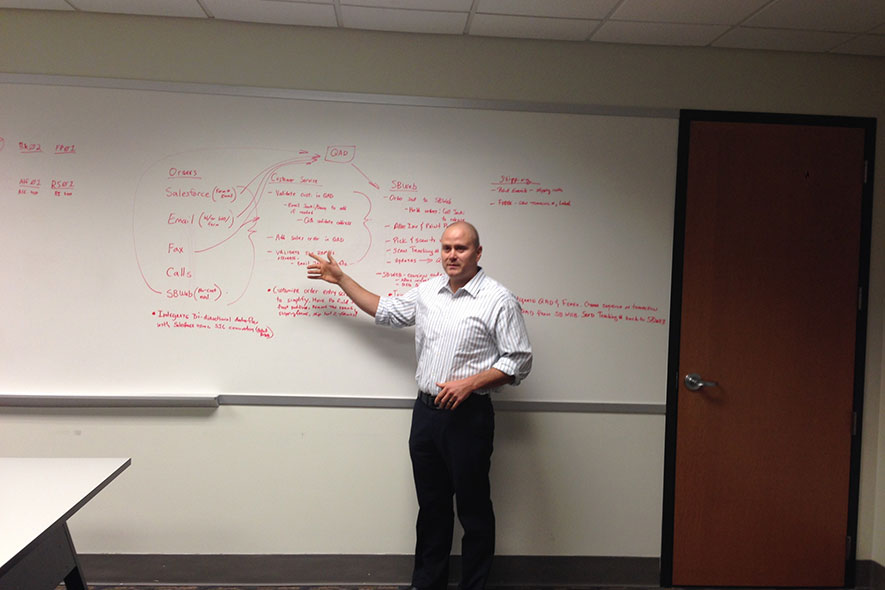
Psychology
Excel in applied statistics and research as you prepare for diverse careers in data analysis and psychometrics.
Psychology, Quantitative Concentration, M.A.
The Quantitative Psychology concentration in the Master of Arts in Psychology in the College of Behavioral and Health Sciences at MTSU is designed to prepare students for applied and research careers as statisticians, psychometricians, data analysts, and quantitative psychologists in education, business, government, and other organizations.
The goals of the program are to help candidates develop:
- research skills to keep up with recent theoretical and practical developments affecting their profession;
- data analysis skills used in organizations;
- skills related to interpretation and communication of statistical output;
- analytical skills for statistical decision-making; and test construction and validation skills with item response theory.
The degree should give graduates an edge in their chosen career or as a Ph.D. applicant. The program has attracted a diverse student body with half of the program's students coming from other states (from Arizona to Michigan to Massachusetts to Florida) or other countries (including Canada, China, India, Japan, South Korea, Slovenia, United Arab Emirates, and Ukraine).
If you live in one of these states: AL KY; you may be able to attend MTSU at in-state rates under the Academic Common Market program.
News Briefs

Students gain experience with advanced statistics
Maryland native Valerie Freund, wanting to do social psychology research and earn a Ph.D., notes MTSU is one of the few terminal master's in quantitative psychology. "I have learned not only the mathematics and conceptual ideas behind a number of advanced statistical techniques but I have also gained experience with writing syntax in the statistical programs, SAS, SPSS, and R," Freund says. "I have also gained practice using item response theory and related computer programs." She used real-world national data during her Discovery Education Assessment internship. James Ford is assisting Dr. Greg Schmidt's research into work group attachment and influence tactics. "The ability to draw conclusions from empirical observations is the cornerstone of science, and understanding quantitative methods is the first step to research, and by that nature, the first step to drawing accurate conclusions that help us understand our world," Ford says. His thesis examines relationships between stress, hostility, depression, and anxiety.

Quantitative psych grad excels in healthcare analytics
MTSU alum Travis Tucker (2001, M.A., quantitative psychology) joined MiMedx as vice president of informatics in 2013. He is responsible for building the analytics group at the small, rapidly growing biotech company in Marietta, Ga. The coursework, faculty, and student interactions at MTSU provided a strong foundation that enabled Tucker to have many early career successes in the healthcare field, particularly in using data for complex decision-making, he says. "The biggest appeal was the low student-to-professor ratio," Tucker says. "Second, the job market was thriving for graduates of this program, especially in the healthcare field. Finally, after a visit to Murfreesboro, I knew that's where I wanted to go. I loved the college-town feel." Tucker, a 1999 University of Central Florida graduate, also has worked at Aspen Marketing Services, Alere Health, Matria Healthcare, and Healthways.
News Briefs
Students gain experience with advanced statistics

Maryland native Valerie Freund, wanting to do social psychology research and earn a Ph.D., notes MTSU is one of the few terminal master's in quantitative psychology. "I have learned not only the mathematics and conceptual ideas behind a number of advanced statistical techniques but I have also gained experience with writing syntax in the statistical programs, SAS, SPSS, and R," Freund says. "I have also gained practice using item response theory and related computer programs." She used real-world national data during her Discovery Education Assessment internship. James Ford is assisting Dr. Greg Schmidt's research into work group attachment and influence tactics. "The ability to draw conclusions from empirical observations is the cornerstone of science, and understanding quantitative methods is the first step to research, and by that nature, the first step to drawing accurate conclusions that help us understand our world," Ford says. His thesis examines relationships between stress, hostility, depression, and anxiety.
Quantitative psych grad excels in healthcare analytics

MTSU alum Travis Tucker (2001, M.A., quantitative psychology) joined MiMedx as vice president of informatics in 2013. He is responsible for building the analytics group at the small, rapidly growing biotech company in Marietta, Ga. The coursework, faculty, and student interactions at MTSU provided a strong foundation that enabled Tucker to have many early career successes in the healthcare field, particularly in using data for complex decision-making, he says. "The biggest appeal was the low student-to-professor ratio," Tucker says. "Second, the job market was thriving for graduates of this program, especially in the healthcare field. Finally, after a visit to Murfreesboro, I knew that's where I wanted to go. I loved the college-town feel." Tucker, a 1999 University of Central Florida graduate, also has worked at Aspen Marketing Services, Alere Health, Matria Healthcare, and Healthways.
Related Media

Psychology, Quantitative Concentration, M.A.
Graduates holding a master’s degree in quantitative psychology may analyze empirical data obtained from scientific research and/or conduct scientific research on psychometrics or statistical phenomena. They also might provide program evaluation and statistical consulting services for government, businesses, hospitals, schools, and other data-collecting agencies. Other job activities could include developing and evaluating mathematical models of psychological phenomena or educational and psychological tests. About one-third of students continue on to doctoral programs in measurement, quantitative psychology, social psychology, or literacy studies. Some suggested occupations for graduates with a master’s in quantitative psychology include:
- Data analyst
- Marketing research analyst
- Program evaluator
- Psychometrician
- SAS programmer
- Statistician
- Research scientists in academic institutions
Employers of MTSU alumni include
- Abbot Vascular
- AdvanceMed
- Blue Cross/Blue Shield of Arizona
- Cigna Government Services
- Discovery Communications
- HCA Healthcare
- HealthStream
- Healthways
- Matria Healthcare
- MedSolutions
- MiMedx Group
- Nissan
- Quorum Health Resources
- SpecialtyCare
- State of Tennessee
- Tennessee Higher Education Commission
- Tennessee Supreme Court
- United Health Group
Doctoral programs where MTSU students were accepted include
- Georgia Tech
- James Madison University
- Middle Tennessee State University
- University of California-Davis
- University of Denver
- University of Minnesota
- University of Oklahoma
- University of South Florida

MTSU’s Career Development Center
MTSU offers a comprehensive Career Development Center that serves students throughout the full student experience and beyond. They collaborate with faculty and staff to equip students with the tools to be marketable to the world of work and continuing education.
Students can schedule an appointment or check online resources and job boards at mtsu.edu/career.
Students can find current internship opportunities by talking to faculty and visiting the University job and internship board called Handshake.
Wondering what you can do with your major? Check out our What Can I Do with A Major In guides.



Graduate
Department of Psychology programs lead to two graduate degrees:
- the Master of Arts (M.A.) with a major in Psychology and concentrations in Applied Research and Methodology, Clinical, Industrial-Organizational, Quantitative Psychology, and Pre-Specialist in Education: School Psychology
- the Specialist in Education (Ed. S) with a major in Curriculum and Instruction and a concentration in School Psychology
A minor in Psychology at the graduate level is also available to other students.
Admission to the quantitative psychology program is a two-part process. The graduate college first decides which students meet the minimum standards for the graduate college. Students who have been admitted to the graduate college are then considered for admission to the quantitative psychology program.
Applicants for MTSU’s quantitative psychology program must have
- an earned bachelor’s degree from an accredited university or college;
- an acceptable grade point average in all college work taken (generally 3.00 or higher);
- an acceptable score on the Graduate Record Examination (GRE) — generally a minimum of 291 (current scale) or 900 (former scale) on the combined Verbal and Quantitative sections.
Admission to graduate study is competitive, and the number of students admitted depends on the availability of adequate faculty supervision.
Most applicants have completed 15 semester hours of psychology, but those without must complete those credits in addition to their graduate program.
Candidates must demonstrate knowledge of the core areas of psychology by completing courses at either the undergraduate or graduate level.
Additional information about program requirements, applying for a graduate assistantship, and receiving in-state tuition is available under the Resources section.
For complete curriculum details, click on the REQUIREMENTS tab above.
Undergraduate
Two undergraduate majors lead to a Bachelor of Science (B.S.) in Psychology and Industrial-Organizational Psychology. The department also offers an online psychology degree in conjunction with University College.
Undergraduates can earn a minor in one of five psychology fields: Psychology, Lifespan Development, Mental Health, Industrial-Organizational, and Neuroscience. The department participates in an interdisciplinary minor in Behavioral Research.
Graduate Assistantships
There is a separate application process to apply for a graduate assistantship (GA) position. The deadline to apply is March 1 for Fall and October 1 for Spring.
Academic Common Market
Students from Alabama and Kentucky may be eligible to receive in-state tuition.
American Psychological Association
The American Psychological Association provides detailed information about quantitative psychology as a profession. Click here for more information.
Comprehensive Examination
Research
- MTSU Human Research Protection Program
- MTSU Library Research Guide for Psychology
- $500 Student Travel Application for Presenting Research at Major Conferences
Writing and APA Format
Related Links

CONTACT US

















